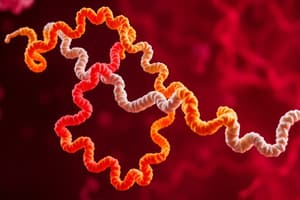Podcast
Questions and Answers
What determines the function of a protein?
What determines the function of a protein?
A protein's specific structure determines how it functions.
Give an example of a protein's function and the molecule it binds to.
Give an example of a protein's function and the molecule it binds to.
Antibodies attach to viruses or bacteria to mark them for destruction by recognizing and binding to a specific foreign substance (antigen).
Explain the relationship between an enzyme and its substrate.
Explain the relationship between an enzyme and its substrate.
An enzyme must recognize and bind closely to its substrate, with specific complementary geometric shapes that fit exactly into one another, similar to a key and lock mechanism.
How does the text define the relationship between protein structure and function?
How does the text define the relationship between protein structure and function?
Describe the specificity of protein binding to other molecules.
Describe the specificity of protein binding to other molecules.
What determines the function of a protein?
What determines the function of a protein?
How does an antibody function in the body?
How does an antibody function in the body?
How would you describe the specificity of protein binding?
How would you describe the specificity of protein binding?
What is the relationship between an enzyme and its substrate?
What is the relationship between an enzyme and its substrate?
What determines the tightness of protein binding to other molecules?
What determines the tightness of protein binding to other molecules?
Flashcards are hidden until you start studying




